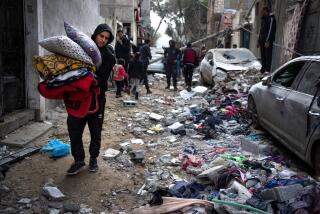Follow the Money
- Share via
President Bush and his advisers have warned that the war against terrorism will be a protracted one that relies on a variety of weapons. They’re right. And some of the most effective weapons will probably be economic.
One immediate tactic is to “starve terrorists of funding,” as Bush said in his speech Thursday. For the months or years they were plotting, the mass murderers who attacked New York and Washington rented homes and cars, paid for flight school and, alas, purchased airline tickets. Now government agencies, including the FBI, Commerce Department, IRS and Customs Service, are moving to cut off the assets that pay for such criminals’ existence. Congress needs to give these agencies increased investigative leeway, and the newly created Office of Homeland Security should make sure there is effective synchronization.
Already, Treasury Secretary Paul H. O’Neill has launched an aggressive campaign to freeze bank accounts linked to terrorists. It won’t be easy. In 1998 President Bill Clinton signed an executive order that permitted the government to freeze any of Osama bin Laden’s assets it could unearth. None have been identified yet, at least in part because the CIA, National Security Council and Department of Justice received little cooperation abroad. That’s got to change.
Still, the difficulty will be that Bin Laden’s local cells don’t rely on their headquarters for money but largely find it themselves by committing crimes and taking jobs. And Bin Laden and his associates have apparently been able to gather contributions fairly easily, in Germany and even the United States. The Bush administration needs to put pressure on Germany and also on the United Arab Emirates and other nations whose loosely regulated banking systems are exploited by Bin Laden. Beyond that, the U.S. should demand that allies intervene in the terrorist leader’s other capitalist endeavors, from buying land in Turkey to operating shrimp boats in Kenya. Meanwhile, probing short-sell orders and sudden sell-offs of insurance or airline stocks in the U.S. and Europe before the Sept. 11 attack also could provide important clues to the operations of terrorists. If any such profits can be located, the U.S. must make sure that governments seize them.
Finally, the power of money should be wielded on the broader strategic battlefield. The nice way to get nations to do what you want is to pay them for it. Pakistan’s finance minister, for example, is eager for the U.S. to help expand Pakistan’s foreign markets and restructure its debilitating foreign debt. Washington has also negotiated a free-trade agreement with Jordan. Other countries as well will no doubt line up for assistance.
For those that don’t, there is always the threat of sanctions. This tactic is not popular with the American business community, which has formed an organization called USA-Engage to promote the idea that sanctions are always self-defeating. They aren’t. Sanctions don’t just cast a moral stigma on countries, they also raise the costs of doing business, and it’s no accident that countries like Iraq are so eager to be rid of them.
It’s true that the world changed Sept. 11. But we must not forget how much it had already changed in the previous decade. Globalization is our greatest ally. Bin Laden’s Al Queda and similar fanatical groups may revel in disrupting the budding transnational marketplace, but most of the world--including the Muslim world--likes it very much. The Saudis want to sell oil. Indonesia wants its factories to thrive. When African truckers can’t find new tires and Asian exporters can’t sell their Gameboys, patience with Bin Laden’s gruesome tantrums--and the wobbly governments that tolerate them--will fade fast.
The advent of a war against terrorism has the United States on a new battlefield. But one truth remains the same: Follow the money.
More to Read
Sign up for Essential California
The most important California stories and recommendations in your inbox every morning.
You may occasionally receive promotional content from the Los Angeles Times.













